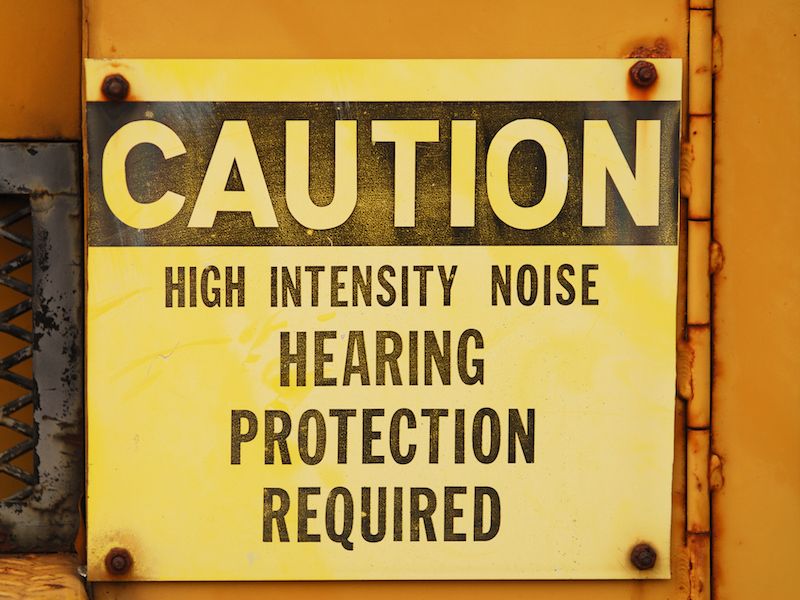
Understanding you need to safeguard your hearing is one thing. It’s a different story to know when to protect your hearing. It’s more challenging than, for example, recognizing when you need sunscreen. (Is it sunny and are you going to be outside? Then you need sunscreen.) It’s not even as simple as knowing when to wear eye protection (Doing some hammering? Cutting some wood or working with hazardous chemicals? Use eye protection).
When it comes to when to use hearing protection, there seems to be a big grey area which can be risky. Unless we have specific information that some place or activity is dangerous we tend to take the easy road which is to avoid the issue entirely.
A Tale of Risk Assessment
In general, we’re not very good at assessing risk, especially when it comes to something as intangible as long term hearing problems or loss of hearing. Here are some examples to prove the point:
- A very loud rock concert is attended by person A. The concert lasts about 3 hours.
- Person B has a landscaping business. After mowing lawns all day, she goes home and quietly reads a book.
- Person C is an office worker.
You might presume that person A (let’s call her Ann, to be a little less clinical) may be in more hearing danger. Ann leaves the performance with ringing ears, and she’ll spend most of the next day, struggling to hear herself talk. Assuming Ann’s activity was risky to her ears would be fair.
The noise that person B (let’s just call her Betty), is exposed to is not as loud. There’s no ringing in her ears. So it must be safer for her hearing, right? Well, not really. Because Betty is mowing every day. So although her ears never ring out with pain, the damage builds up slowly. Even moderate sounds, if experienced with enough frequency, can injury your hearing.
What’s going on with person C (let’s call her Chris) is even more difficult to sort out. The majority of people realize that you should protect your hearing while using machines such as a lawnmower. But even though Chris works in a quiet office, she has a very noisy, hour-long commute every day through the city. Additionally, while she works behind her desk all day, she listens to her music through earbuds. Is protection something she should consider?
When is it Time to Start to Think About Protecting Your Hearing?
Generally speaking, you need to turn down the volume if you have to shout to be heard. And you should think about using earplugs or earmuffs if your environment is that noisy.
The cutoff needs to be 85dB if you want to be clinical. Noises above 85dB have the capacity to result in damage over time, so in those circumstances, you need to consider using hearing protection.
Many hearing professionals advise getting a specialized app to monitor noise levels so you will be cognizant of when the 85dB has been reached. These apps can let you know when the ambient sound is approaching a hazardous level, and you can take appropriate steps.
A Few Examples
Your phone may not be with you wherever you go even if you do download the app. So a few examples of when to protect your ears might help you establish a good standard. Here we go:
- Listening to music with earbuds. OK, this doesn’t require protection but does require care. Pay attention to how loud the music is, how long you’re listening to it, and whether it’s playing directly into your ears. Think about getting headphones that cancel out outside sound so you don’t have to crank up the volume to damaging levels.
- Using Power Tools: You recognize that working every day at your factory job will require ear protection. But what if you’re simply working in your garage all day? Most hearing professionals will suggest you wear hearing protection when using power tools, even if it’s only on a hobbyist level.
- Exercise: You know your morning cycling class? Or perhaps your daily elliptical session. All of these cases might require ear protection. Those instructors who use sound systems and microphones (and loud music) to motivate you may be good for your heart rate, but all that volume is bad for your hearing.
- Residential Chores: We already discussed how something as straightforward as mowing the lawn, when done frequently, can call for hearing protection. Cutting the grass is a good illustration of the type of household chore that might cause harm to your hearing but that you probably don’t think about all that often.
- Driving & Commuting: Driving all day as an Uber or Lyft driver? Or maybe you’re just hanging out downtown for work or boarding the subway. The noise of living in the city is bad enough for your hearing, not to mention the added damage caused by cranking up your tunes to drown out the city noise.
A good baseline may be established by these examples. If there is any doubt, however, use protection. Instead of leaving your ears exposed to future injury, in most instances, it’s better to protect your hearing. If you want to be able to hear tomorrow, protect today.



